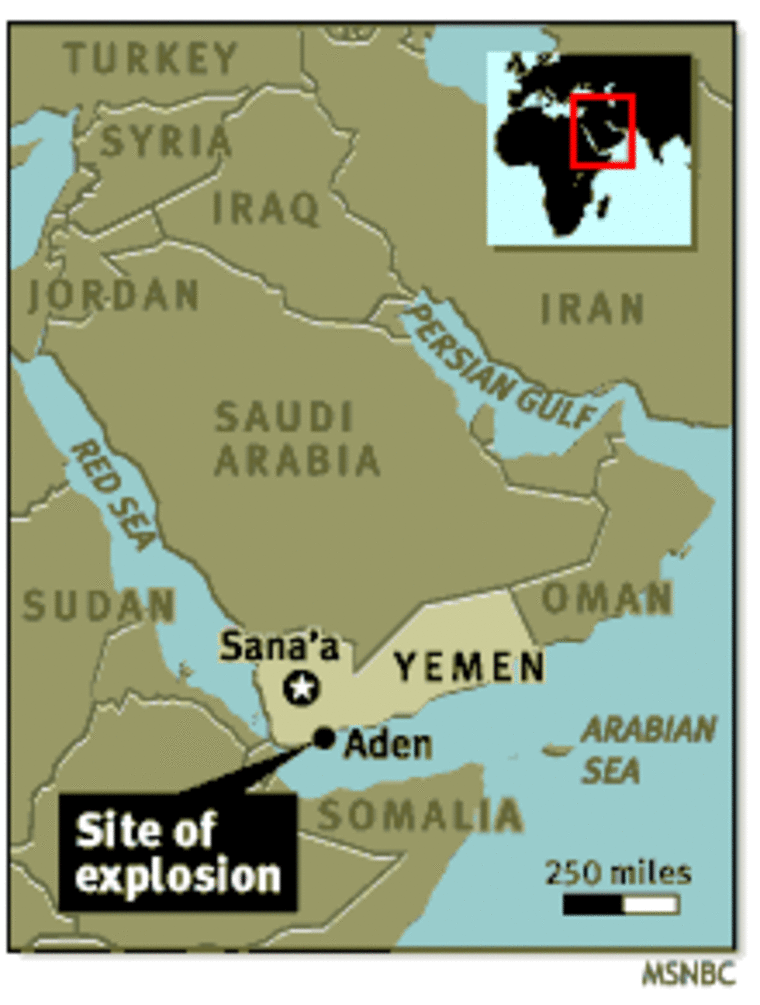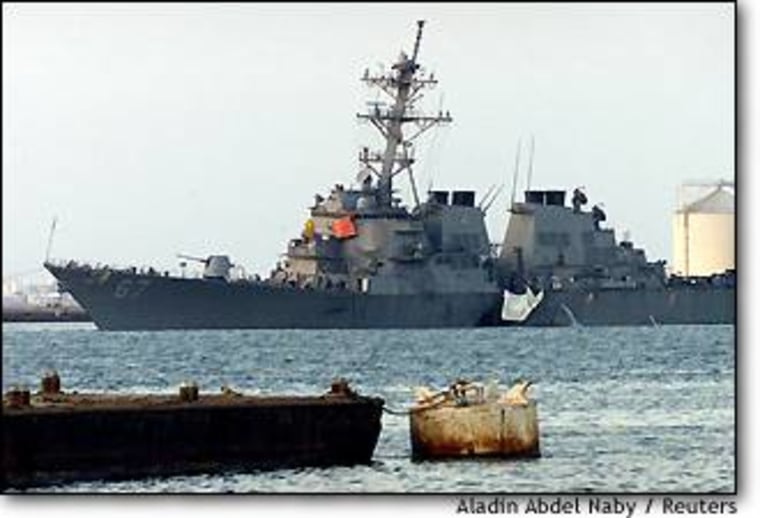U.S. military and civilian officials say a report recommending action to foil potential terrorist strikes against American warships in Yemen, including the kind of attack which killed 17 sailors on the USS Cole Thursday, was never fully implemented for fear of complicating relations with the host country.
>CIVILIAN PERSONNEL ASSIGNED to the Naval Criminal Investigation Service and attached to the U.S. Fifth Fleet command in Bahrain conducted thorough surveys of the security arrangements surrounding the port at Aden, and made extensive recommendations during the spring of 1999, as the Navy refueling port was just being brought up to speed, the sources said.
According to a military official on site at the time, a naval investigative team assigned to do the threat assessment maneuvered through the harbor with military and U.S. embassy personnel in a small craft similar to the one used to carry explosives to the destroyer USS Cole. Among the risks the team’s report detailed was the danger of unsupervised small craft approaching ships as they were vulnerable during refueling. Even though the report urged the State Department and Pentagon officials responsible for protecting U.S. ships to take steps to secure the perimeter of the port from small craft and other threats, serious breaches of security continued to exist, these officials said.
“They recognized the threat,” said one military official. But, the official said, the military and State Department personnel in charge “decided it was politically unwise to militarize the port.”
SOME STEPS TAKEN
A State Department spokesperson, contacted Friday about the report, referred questions to the Navy. A Navy spokesperson, in turn, referred MSNBC.com back to the State Department, saying: “Yemen is a defense fuel support point that has been used 12 times during the past year, usually when an oiler (a ship that provides fuel replenishment while ships are underway) is not a part of the battle group, and arrangements are made for support [at Aden] through the embassy.”
In the face of increasing terrorist threats throughout the region, some security precautions were put in place in Aden, according to military and intelligence sources familiar with regional security. For instance, Navy ships refueling at the facility originally stopped within approximately 25 yards of the main immigration port, but are now moored farther out in the bay with room to maneuver. Another change banned unauthorized small craft and fishing boats from the vicinity of the refueling docks.
However, the standard military procedure in response to such threats would be to institute a security regimen even for authorized small craft. If such procedures were in place in Yemen, they failed badly Thursday.
U.S. Navy SEALS - special units trained for underwater operations - were sent to Yemen as part of a humanitarian effort aimed at de-mining the port in 1999.
The SEALS cleared the harbor by detonating warships sunk there during the Yemeni civil war that ended in 1990, removing obstacles which could have impeded ships or concealed explosives.
But significant and obvious risks remained, military and intelligence officials said. After the Iraqi oil embargo, for instance, several tankers were abandoned in the harbor and still remain moored there, a possible staging area for terrorist activity.
Another problem: U.S. intelligence sources said security procedures were relatively lax regarding local vendors who provide fuel, small craft, and supplies to refueling ships. This is particularly dangerous in the city of Aden, where the population still has divided allegiances after a long and economically destabilizing civil war, and where corruption is rampant.
‘NO COUNTERMEASURES’
All this, said a senior U.S. intelligence official, made U.S. ships refueling at Aden a disaster waiting to happen. “At a minimum there should have been constant surveillance of the area that would have allowed for timely interdiction of a possible threat with the capability to respond,” the official said.
“All the surveillance in the world doesn’t matter unless you have the ability to react in a timely manner to an inbound threat, before it reaches a critical point,” the official said. “All indications are at this point that there were no countermeasures to mitigate threat - either the report was ignored, or it was determined to be not politically desirable to implement all the recommendations for force protection. Coulda, shoulda, didn’t.”

According to senior U.S. intelligence sources, the USS Cole, and other ships of her class, were under routine and constant surveillance by terrorist elements during their journey into the Mediterranean and through the Suez Canal en route to the Red Sea.
Terrorists would have charted the progress of the ships for months, observing their timetables and security procedures at each stop. Terrorists became so familiar with the ship routes, said the senior U.S. intelligence official, that they were able to identify the most vulnerable place to strike - a so-called “soft target.”
“Terrorists don’t go after ‘hard targets’,” the official explained. “They don’t have the capability. Going after a hard target is a full assault, or a highly trained and equipped special operations team. They pick a target that is vulnerable to an attack by a small team with local support.”
Prior to refueling at Aden, U.S. Navy ships passing through the Suez Canal would have routinely notified the U.S. Embassy and military staff in Yemen of their estimated time of arrival. Plans would then be made to contract with local vendors for fuel, supplies, and the small craft needed to service the ships. It is at this point that U.S. intelligence officials say lax operational security created a perfect climate for the tragedy.
A PAPER TRAIL
Paperwork generated in the form of pay slips or invoices would leave a plain trail to vendors, and poor security at the point where the small craft were loaded would have left terrorists an easy route in.
This is particularly important in light of U.S. intelligence reports indicating Saudi exile Osama bin Laden gave orders to move out one of his terrorist units seven days ago, destination unknown. Such reports are routinely circulated to the embassy and military officials in Yemen, and the military generally puts naval personnel on a heightened alert status. Although most terrorist groups are loosely organized and poorly trained, sophisticated groups such as the ring organized by bin Laden have the technical capability to easily monitor communications to and from the embassy.
“A monkey could have planned the damn thing because the embassy coordinates the contracts well in advance,” said one U.S. military official.
The port of Aden is owned by the government of Yemen, and maintained by the Singapore Port Authority. Business in the port, and indeed in all of Yemen, is a complex ritual of bribery and extortion - often done under the guise of “additional fees” - that drives the economy of this desperately poor country. For this reason, the government and majority of Yemeni citizens welcome the American presence, and wish it to expand.
Yemen has also long been a transit point for arms and terrorists, which are tolerated, but not sanctioned, by the Yemeni government. Kidnappings are frequent in Yemen, but are almost always tribally motivated and have everything to do with extortion, and little to do with international terrorism.
Guerrilla organizations traditionally come to Yemen to train, to hide and to organize. Hamas has maintained offices there for years, and bin Laden had open training camps there until 1992. Among the major terrorist groups operating in Yemen of particular interest to U.S. intelligence sources are the militant wing of Yemen’s Islah opposition party and Egyptian Islamic Jihad. The EIJ is regionally active, violent, has the infrastructure to support a well-planned attack and has hit U.S. targets before. The militant wing of Islah is suspect only because of its leader’s ties to bin Laden.
Many in Yemen see no conflict in the presence of such notorious organizations on their soil; to them, it is just another business.
Sue Lackey is an investigative reporter whose work has appeared frequently on MSNBC.com. Her last report for the site, on Russian-organized crime syndicates arming Colombia’s FARC rebels, appeared in July.
